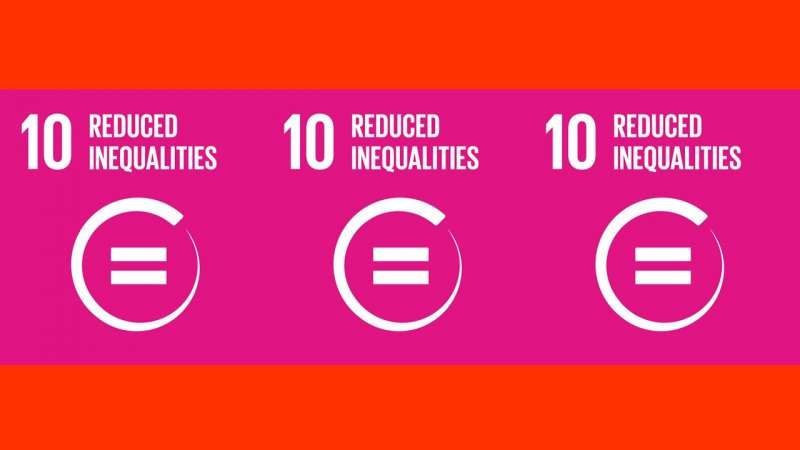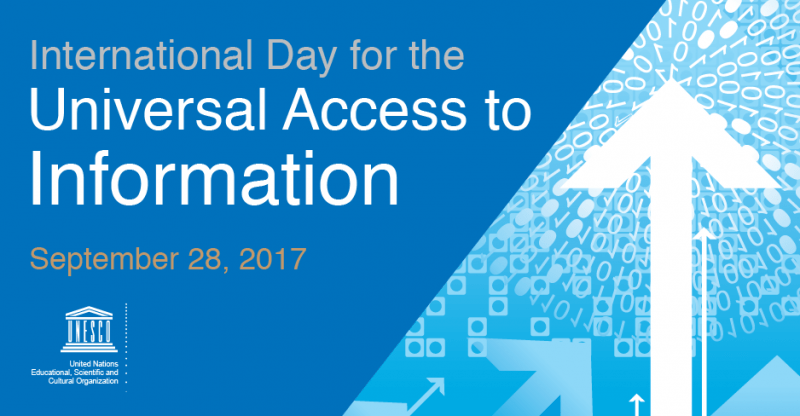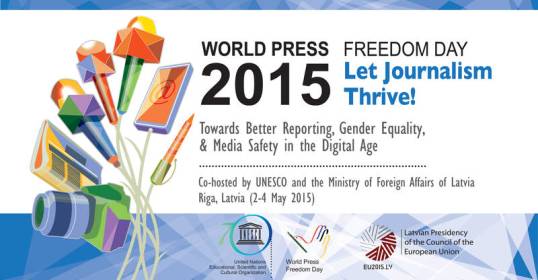On this Day WHO joined partners to celebrate “a day for all”. This theme reflects a growing understanding that disability is part of the human condition. Almost everyone will be temporarily or permanently impaired at some point in life. Despite this, few countries have adequate mechanisms in place to respond fully to the needs of people with disabilities.
You can click here to access the event page content.
World Press Freedom Day 2019
Around 1000 participants and high-profile speakers are expected to attend the event, including representatives from governmental and international organizations, the media, academia and civil society.
Since 1993, when the UN General Assembly declared 3 May World Press Freedom, this day has represented an opportunity to celebrate the fundamental principles of press freedom and develop joint initiatives in this area. It also serves as an occasion to remind citizens that in many countries around the world, censorship is rife, while journalists, editors and publishers continue to be harassed, attacked, detained and even murdered.
See the event page here.
Promoting Accessible ICT in Uganda
By Ashnah Kalemera |
The challenges faced by persons with disabilities (PWDs) in accessing information online and financial services since Uganda introduced taxes on social media access and mobile money transactions came to light last August. These taxes added to the catalogue of barriers to promoting access to Information and Communications Technology (ICT) for disabled persons in the country.
Indeed, national statistics for internet and telephone penetration (49% and 69% respectively), are not disaggregated by disability which in itself could be telling of the state of digital accessibility for PWDs in Uganda. General barriers to ICT use in Uganda include high costs of accessing and owning ICT; a shortage of usage skills which is linked to low adult literacy rates; poor electricity and telephone network coverage in rural and underserved areas.
Furthermore, uptake of ICT for PWDs is hampered by the high cost of assistive technology; low levels of ICT and disabilities literacy among policy makers, academia, civil society and other stakeholders; non-implementation of policies related to ICT access for PWDs; and unavailability of relevant software in local languages. See draft ICT for Disability Policy (2017).
As a party to the United Nations Convention on the Rights of the Persons with Disabilities (CRPD), the government of Uganda has been working to ensure equal opportunities and inclusion of persons with disabilities.
Article 9 of the CRPD calls on state parties to take appropriate measures to ensure accessibility of ICT to persons with disability. The CRPD also calls on member states to ensure that private sector service providers, including through the internet, provide information and services in accessible and usable formats for persons with disabilities.
Following the drafting of the ICT Policy for Disability last year, the Ministry of ICT and National Guidance has also drafted Accessible Publishing Guidelines and an Accessible ICT Procurement Policy. The publishing guidelines are aimed at ensuring that government communications, documents and publications (print or electronic) are universally accessible at the same time and no extra cost to PWDs. They build on the Guidelines for Development and Management of Government Websites which set out requirements for accessibility for audio, visual and speech impaired users.
For its part, the proposed procurement policy requires all government Ministries, Departments and Agencies (MDAs) to ensure that PWDs have access to all government electronic facilities, resources and services by incorporating accessibility requirements in procurement of goods and services.
Speaking at an awareness-raising workshop on the proposed policies on October 11, 2018, Silas Ngabirano, the Assistant Commissioner for Information Management Services at the ICT ministry, stated that the policies had undergone participatory consultations, with input from MDAs, local government authorities, the private sector, civil society organisations, development partners and the media.
The proposed implementation plans for the policies include establishment of a national accessibility centre, set up of ICT and disability focal points at each MDA, monitoring of government ICT services for accessibility, and support to private sector initiatives working on accessible ICT products and services.
It remains unclear when the various policies are expected to be finalised. However, according to ICT Ministry, implementation of certain aspects of the proposed policies was already underway. For instance, all education institutions are currently required to have computer terminals accessible for students with disabilities. However, as highlighted by a lecturer participant from Makerere University, infrastructure at the university and many other institutions remained under-equipped for PWDs while course assessment procedures hardly took into account the needs of students with disabilities.
Meanwhile, the Uganda Communications Commission is working to enforce compliance with ICT licensing requirements and regulations with regards to sign language interpretation and subtitles by television broadcasters. In a notice issued on October 19, 2018, UCC states that effective January 1, 2019, it “shall not renew” licenses of any television operators not compliant with the provisions of the Persons with Disabilities Act, 2006. Section 21(2)(a) of the Act states that “Any person who owns a television station shall provide sign language inset or subtitles in at least one major news cast program each day and in all special programs of national significance.”
Further, in partnership with United Nations Educational, Scientific and Cultural Organisation (UNESCO), the Uganda government is working to develop an information portal, which once finalised, will track implementation of policies on assistive technologies and provide information and experiences of ongoing accessibility initiatives in the country. Previously, UNESCO has helped to conduct a training for Uganda government officials on web accessibility for PWDs.
At the sensitisation workshop, stakeholders acknowledged that implementation of the proposed policies and existing legal and regulatory frameworks is hindered by inadequate data on PWDs for effective planning. Resource requirements for provision of assistive devices, large print or magnifiers, materials in braille and video captioning, were also cited as a challenge.
Universal Access to Information in Africa: What Governments Need to Do
By Edrine Wanyama |
The annual celebration of the International Day for Universal Access to Information (IDUAI) on September 28 is aimed at highlighting the importance of access to Information (ATI) as a cornerstone of all other rights. This year’s IDUAI celebrations were held in Mauritius, organised by the United Nations Educational, Scientific and Cultural Organisation (UNESCO) as part of the E-learning Africa summit (E-Summit). The summit is a fora for deliberation on issues of access to learning and vocational training, access to information, equality and quality in education, literacy and governance with prioritisation of sustainable development solutions.
The Collaboration on International ICT Policy for East and Southern Africa (CIPESA) participated at the e-Summit, making contributions on open access to information and the prerequisites for ATI, including highlighting the need for a conducive policy, legislative and regulatory environment to ensure universal access to information in Africa. Among the measures proposed at the meeting were the full recognition of ATI by more African states supported by the implementation of ATI laws and regulations which effectively empower citizens to demand for information.
Discussions at the summit also entailed a call for governments to ease access to information across multiple platforms including online, in print and through traditional media, alongside clear procedures on how information can be accessed in instances when it is not publicly available. Further, there should be efforts to minimise the costs of accessing information as well as making clear provision for timely information request processing, response and complaints handling mechanisms. A key enabler of the realisation of ATI in many countries will be the repealing of draconian and conflicting legislation and putting in place robust personal data protection measures.
Meanwhile, at the Forum on Internet Freedom in Africa hosted by CIPESA in Johannesburg, South Africa, there was emphasis on the need for governments to limit exemptions to accessible information, improve on data storage mechanisms and systems, provide for mandatory disclosure of information and put in place strong and functional penal mechanisms against information officers who deny citizens information.
Access to information (ATI) is a fundamental human right recognised by international human rights instruments, including articles 19 in both the Universal Declaration of Human Right and the International Covenant on Civil and Political Rights. These articles provide for, among others, the right to freedom of opinion and expression including receiving and imparting information and ideas through media. ATI is also recognised in articles 13(1) and 17 of the Declaration on the Rights of the Child; article 15 of the United Nations Declaration on the Rights of Indigenous People; and the United Nations General Assembly Resolution 59 (1).
The summit brought together participants from all the 54 African countries. However, African countries continue to grapple with enacting ATI laws. Out of 54 countries, only 22 have enacted ATI laws. Additionally, these existing laws have been criticised for failing to meet international minimum standards, with limitation to access outweighing access rights.
Despite the overwhelming participation of African countries, the dilemma remains in the low response to ATI legislation. It should be noted that the lack of ATI legislation negatively impacts accountability and transparency by the state, which are tenets grounded on access to information.
Let Journalism Thrive! Towards Better Reporting, Gender Equality, and Media Safety in the Digital Age
UNESCO |
Every year, 3 May is a date which celebrates the fundamental principles of press freedom; to evaluate press freedom around the world, to defend the media from attacks on their independence and to pay tribute to journalists who have lost their lives in the exercise of their profession.
Over 100 national celebrations take place each year to commemorate this Day. UNESCO leads the worldwide celebration by identifying the global thematic and organizing the main event in different parts of world every year.
The international day was proclaimed by the UN General Assembly in 1993 following a Recommendation adopted at the 26th Session of UNESCO’s General Conference in 1991. This in turn was a response to a call by African journalists who in 1991 produced the landmark Windhoek Declaration on media pluralism and independence.
To mark the 2015 World Press Freedom day, UNESCO will lead the global celebration with a main event under the theme “Let Journalism Thrive! Towards Better Reporting, Gender Equality, and Media Safety in the Digital Age”. The event is co-organized by UNESCO and the Government of Latvia, and will take place from 2-4 May 2015 in Riga, Latvia.
The Collaboration on International ICT Policy in East and Southern Africa (CIPESA) will be participating in the event represented by Wairagala Wakabi as one of the speakers in the Plenary 3 Session on “Digital Safety for Journalists” on 4 May 2015. The discussions during this session will be enriched by CIPESA’s experience and expertise, particularly under its OpenNet Africa initiative.
Meanwhile, on May 2, CIPESA will convene journalists in Kampala, Uganda for digital safety training as part of its ongoing online security capacity building efforts for human rights defenders, minority groups, activists and the media in East Africa.



